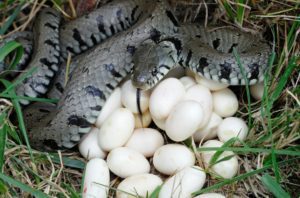 It is one of the scariest things to stumble upon a bunch of small, whitish eggs while cleaning your yard or trimming bushes and trees. Most people don’t know how to get rid of snake eggs or deal with the situation. They don’t even know how to identify whether they actually are a snake’s eggs or are of another reptile’s.
It is one of the scariest things to stumble upon a bunch of small, whitish eggs while cleaning your yard or trimming bushes and trees. Most people don’t know how to get rid of snake eggs or deal with the situation. They don’t even know how to identify whether they actually are a snake’s eggs or are of another reptile’s.
I was one of those ignorant poor souls once. Then google, wildlife documentaries and our local animal protection employee told me what to do in such a situation. In the article below, I have described options through which you can get rid of snake eggs harmlessly. First, you should know what a snake egg looks like to be sure you have a snake situation at hand.
Let’s find out what to do when you find snake eggs on your property.
Identify the Eggs First
It is necessary to confirm whose eggs you have stumbled upon before taking action. You can identify snake eggs through the following two techniques.
1st Criteria: Appearance
During my research on snake riddance techniques, I met many people who believe that snake eggs resemble bird eggs or chicken eggs. Ha ha, that’s quite a bizarre thing to say. Let me clear this misconception. Snake eggs don’t look like birds’ or chickens’ eggs, not by a long shot. People have made such outlandish claims just by colour similarity, I guess. Their colour is white or off-whitish.
Next time you see a bird or chicken egg, pick it up to closely inspect it. It’s a hard-shelled egg having a roundish shape. Alternatively, a snake egg has a soft rubbery-like shell and is oblong-shaped. As far as the size goes, it varies from species to species. A rough consensus is that they are about one inch long but grow larger during incubation.
Note: It’s hard, if not impossible, to identify snake eggs according to the species unless you are a professional or have vast experience with snakes.
2nd Criteria: Location
The majority of snake species choose secluded and hidden places for laying eggs. They prefer to bury their eggs in moist ground, layers of dirt or compost, in a hollow space inside a dying tree, under dense bushes or in manure.
How to Get Rid of Snake Eggs
You don’t have many options here. If you are wondering how to get rid of snake eggs, below are your choices.
-
Leave Them Where They Are
If you stumble upon snake eggs, leave them where they are. In their bravery, people forget that the mother snake usually hangs around the nest to protect the eggs. Mommy snakes tend to get vicious if they see you messing with their eggs. So, if you come across snake eggs or a snake’s nest, leave it the hell alone.
-
Move Them
Well, that’s a risky move, I must warn you. But, if you aren’t willing to leave the eggs alone to develop into baby snakes, move them somewhere else. Look for a deserted and hidden area in the vicinity. Collect the eggs in a shovel or a basket and deposit them there.
Wait, not too fast, people. Before you touch the eggs, keep an eye out for the mommy snake. Oh, you don’t want to face the wrath of an angry mother.
Also, make sure the place you are moving them to is safe from predators.
-
Call Wildlife Service or Animal Protection
Why should you put yourself in danger when you have people to do the dirty work for you? As I said earlier, identifying eggs according to snake species is not a layman’s job. It requires a comprehensive study of snakes and years of experience with the creatures. You might unknowingly provoke a venomous snake while dealing with the eggs. Therefore, immediately call a wildlife service or your local animal protection services whenever you stumble upon a bunch of snake eggs. They will know what to do with the eggs.
In addition, they will also help you with the mother snake and may destroy the den for you.
-
Create Anti-Snake Environment
When you have dealt with snake eggs and the nest, start working on creating an anti-snake environment to prevent another snake from making a home on your turf. You can do that by:
- Seal your home so that snakes don’t find a way to get in your house.
- Don’t let grass and bushes grow tall and dense.
- Control rodents and pests to not provide easy food to snakes.
- Repair gaps, cracks and broken windows, ventilation ducts, drainages and septic systems.
- Use repellents around potential snake hideouts in your house and yard.
Conclusion
The phobia of snakes doesn’t let people ignore snake eggs when they discover them in their houses. They want them gone because eggs mean the mother snake will also be nearby. But, first, you should confirm whether the eggs really are of a snake’s or not. Afterwards, if you are still hell-bent on getting rid of them, move them to a safe place or call animal protection services to do that for you. It is uncommon to find venomous snake eggs in the USA, so leaving them undisturbed is also an option. If you are okay with that, then sharing the same space with a snake’s nest isn’t as scary as you think, especially if it’s beneficial and harmless. Lastly, make your house unattracted so that another snake doesn’t get a chance to come and lay eggs there.
